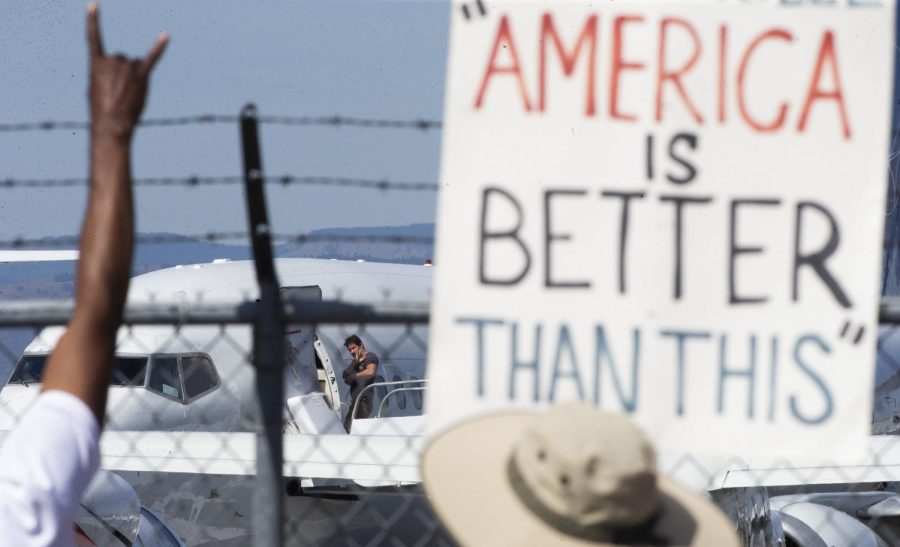Editorial: Stand with our immigrants
An ICE detainee waves at people chanting and holding signs along the fence while boarding a Swift Air flight on Tuesday, Aug. 20, 2019 at McCormick Air Center in Yakima, Wash. (Evan Abell / Yakima Herald-Republic via AP)/Yakima Herald-Republic via AP)
August 25, 2019
Over the weekend, agents arrested 15 undocumented immigrants in St. Rose, Louisiana, according to the U.S. Border Patrol. Fourteen of the arrested people are Mexican, while one is Nicaraguan. They were turned in by the Gulf Coast Safety Council after trying to take the safety training offered at the establishment. One of the 15 arrested is a minor. The adults are being held at the St. Tammany Parish Jail and the minor has already been processed for removal from the U.S.
These are the facts. It is easy to read these words and feel nothing. We don’t know these people. It’s become commonplace to see news clips, read Facebook statuses and hold debates all centered around the legality of human beings. However, it becomes more real, more impactful when it happens in our backyard.
Immigration raids have been at the forefront of conversations due to the current president’s rhetoric and “zero-tolerance” policy regarding illegal immigration. President Donald Trump is infamously quoted as having said, “(Mexican illegal immigrants) are bringing drugs. They’re bringing crime. They’re rapists. And some, I assume, are good people.”
This viral soundbite has been replayed for the last two and a half years. However, its repulsiveness should not be forgotten. Like much of what the president says, it is racist and, factually, wrong. In fact, “incarceration rates amongst undocumented immigrants were about half those of native-born Americans in 2017”, according to the CATO Institute, a public policy research institute. CATO has also conducted research on undocumented immigrants in Texas, and found that “crime along the Mexican border is much lower than in the rest of the country”, and that “police clearance rates are not lower in states with many undocumented immigrants – which means that they do not escape conviction by leaving the country after committing crimes.”
Last week, the rhetoric, the debates and the raids arrived at our doorstep.
New Orleans provides an interesting case study of immigration working; a microcosm of our country. Our city, our home, was built by immigrants more than 300 years ago and immigrants have continued to play a vital role in defining and revolutionizing what New Orleans is and who New Orleanians are.
The most recent example, of course, is the post-Katrina influx of Latinx immigrants. After the hurricane, Latinx people from all over Central America were recruited to come to New Orleans to do the work that very few wanted or had the capacity to do: rebuild the city.
In the months after the storm, an estimated 100,000 Hispanics came to the New Orleans metro area, according to The Times-Picayune | New Orleans Advocate. This migration wasn’t just a temporary change either, census data shows that the Latinx population in New Orleans has increased by 40% since 2000.
However, our ties to Latinx people are of more than just statistical or historical importance.
There is no denying that our campus is home to a large population of immigrants and children of immigrants. In fact, all of us, excluding our Native American population, are still the descendents of immigrants.
Twenty-one percent of the new freshman class identifies as Hispanic/Latinx. As a Jesuit institution, we have a responsibility to protect our university’s and city’s Latinx people. It’s what Iggy would want: men and women for and with others, even undocumented immigrants.
Our advocacy or ambivalence about the treatment of immigrants is our advocacy for or ambivalence to our classmates, our family members, our fellow Jesuits, and, for The Maroon, members of our own staff.
Now is not the time to turn a blind eye. We must not become comfortable with this new reality. Whether you are Irish, or French or German or British, there’s a good chance that you’re here now because of an immigrant. If your family has been here for a long time, there’s an even better chance you have an illegal immigrant to thank.








